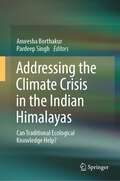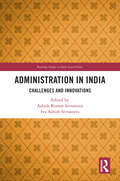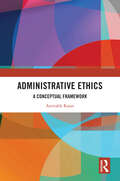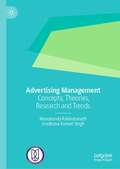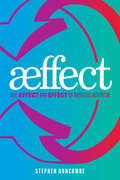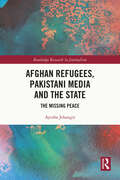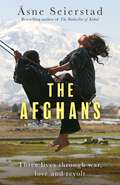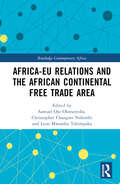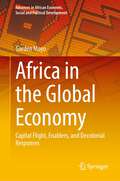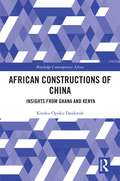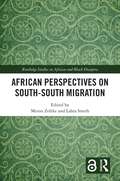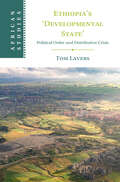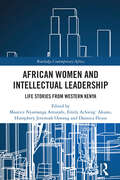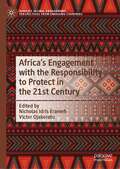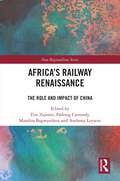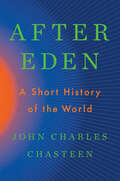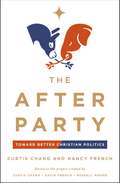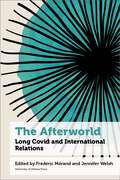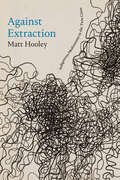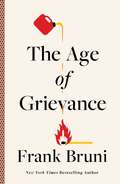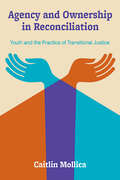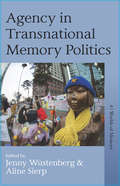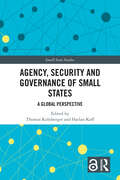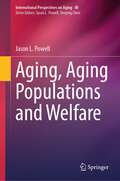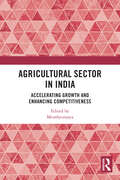- Table View
- List View
Addressing the Climate Crisis in the Indian Himalayas: Can Traditional Ecological Knowledge Help?
by Anwesha Borthakur Pardeep SinghThis book focuses on the traditional ecological knowledge in addressing the current climate crisis in the Indian Himalayas. Local or indigenous people in the Himalayas, through their low-carbon producing lifestyles, contribute very little to the climate crisis. However, at the same time, they bear the brunt of this crisis way more than many others. It is important to learn about their traditional ways of life and the knowledge that they hold regarding ecology and environment. Traditional ecological knowledge and associated belief systems are given increasing attention across the globe in recent times toward addressing some of the grave environmental concerns. Climate change is one such concern. The rising consideration of concepts such as ethnoecology and ethnobotany signifies the scientific, socio-cultural and economic potential of the traditional ecological knowledge systems. It is indisputable that these knowledge systems have the ability to provide important insights towards tackling many present-day environmental distresses including several climate change challenges. In this book, the authors concentrate on such traditional ecological knowledge systems in the Indian Himalayan region and try to figure out their significance in relation to the modern science. Overall, the authors attempt to write a book where the relevance of traditional ecological knowledge systems could be addressed and communicated to a larger audience—both academic scientific and non-academic.
Administration in India: Challenges and Innovations (Routledge Studies in South Asian Politics)
by Ashish Kumar Srivastava Iva Ashish SrivastavaThis book offers a comprehensive analysis of the administration in India from independence to date. It examines the major transformation in the administrative service initiated by the ‘Minimum Government and Maximum Governance’ initiative of the Government of India in 2014. In spite of enormous diversity and population, India has made remarkable progress in various fields such as health, education, infrastructure, and technology. Structured in three parts, (1) social sector, (2) infrastructure and economy, and (3) e-governance and service delivery, the book examines challenges of governance and provides insight into different innovations undertaken to address these challenges. E-governance lies at the core of this transformation of accountability, transparency, and time-bound service delivery. Contributions in this book are written by experts working in the Indian Administrative Service (IAS), academia, and the private sector and cover a wide spectrum of administration from the point of view of different departments of government, as well as the experiences of the authors ranging from senior bureaucrats to mid-career officers and analyses of researchers on administration and its challenges. The initiatives covered in this book can serve as solutions to similar challenges faced by other developing countries in the world. The book will be of interest to researchers in the fields of administration and policy, civil service, public management, South Asian politics, and Development Studies.
Administrative Ethics: A Conceptual Framework
by Amitabh RajanThis insightful book explores the use and application of ethics in contemporary governance and suggests necessary reforms. Following an interdisciplinary approach involving the fields of political science, law, economics, sociology, management, and philosophy, this book analyses their applicability and usefulness in everyday practices in governance, covering its five cardinal virtues—prudence, transparency, discourse, justice, and accountability. Highlighting ethical challenges in aspects of status recognition, oppression, empowerment, social care, public financing, environment protection and others in today’s interconnected world, it delves into the dynamics of administrative power in democracies and showcases how the misuse of power can be controlled through a discourse of ethics in law and governance. The book will be useful to the students, researchers and teachers of public administration, philosophy, political Science, corporate ethics, and governance other related social sciences disciplines. The book will also be an indispensable companion to social activists, advocacy groups, journalists and civil society institutions and public service training institutions.
Advertising Management: Concepts, Theories, Research and Trends
by Manukonda Rabindranath Aradhana Kumari SinghThis book explores the concept of advertising and the different ways advertising is understood and evaluated. It dives deep into planning, designing, and executing advertising campaigns on different mediums. It discusses the theoretical and research parts of advertising by critically examining how over the years various hierarchical models and theories are developed by advertising experts.It examines various models and theories that explain why and how advertising is successful in persuading customers/target audiences to buy a product or accept an idea for behavioural change. It will help readers to understand the significance of advertising and consumer psychology which has a critical role in purchasing a product or an idea.
Aeffect: The Affect and Effect of Artistic Activism
by Stephen DuncombeThe first book to seriously identify how artistic activism works and how to make it work betterThe past decade has seen an explosion in the hybrid practice of “artistic activism,” as artists have turned toward activism to make their work more socially impactful and activists have adopted techniques and perspectives from the arts to make their interventions more creative. Yet questions haunt the practice: Does artistic activism work aesthetically? Does it work politically? And what does “working” even mean when one combines art and activism? In Æffect, author Stephen Duncombe sets out to address these questions at the heart of the field of artistic activism.Written by the co-founder and current Research Director of the internationally recognized Center for Artistic Activism, Æffect draws on Duncombe’s more than twenty-five years of experience in the field and one hundred in-depth interviews with artistic activists worldwide. More than a mere academic exercise, the theory, research, and tools in this book lay the groundwork for artistic activists to evaluate and strengthen their practice and to create better projects. The exploration of good artistic activism is grounded in three sets of concerns. 1) Change: Upon what theories of change is artistic activism based? 2) Intention: What do we hope and expect artistic activism to do, and how does it do this? 3) Evaluation: What actually happens as the result of an artistic activist intervention? Can it be measured?Æffect is rich with examples that demonstrate successful artistic activism, including Undocubus, an old bus painted “No Fear” across its side that was driven cross-country by a group of undocumented immigrant activists; Journal Rappé, a video show created by Senegalese rappers who created long-form investigative reports by rapping the current news in French and Wolof; and War on Smog, a staged a public performance piece by artistic activists in the city of Chongqing in Southwest China. Scannable QR codes are included to provide tools that help readers assess the æffect of their artistic activism.
Afghan Refugees, Pakistani Media and the State: The Missing Peace (Routledge Research in Journalism)
by Ayesha JehangirDrawing on the frameworks of peace journalism, this book offers new insights into the Pakistani media coverage of Afghan refugees and their forced repatriation from Pakistan. Based on a three-year-study, the author examines the political, social and economic forces that influence and govern the reporting practices of journalists covering the protracted refugee conflict between Pakistan and Afghanistan. Through a critical discourse analysis of the structures of journalistic iterability of Afghan refugees in Pakistan, the author distils four dominant and three emerging frames, and proposes a new teleological turn for peace journalism as deliberative practice, that is to say practice that by promoting transparency and accountability (recognition) and challenging dominant power-proposed narratives and perspectives (resistance) encourages public engagement and participation (cosmopolitan solidarity). The author also privileges an analytical approach that conceptualises the nexus between digital witnessing and peace journalism through the paradigm of cosmopolitanism. The author finds routinely accommodated media narratives of security that represent Afghan refugees as a ‘threat’, a ‘burden’ and the ‘other’ that, through reinforcement, have become an incontestable reality for the public in Pakistan. This book will appeal to those interested in studying and practicing journalism as a conscientious communicative practice that elicits the very public it seeks to inform.
The Afghans: Three lives through war, love and revolt - from the bestselling author of The Bookseller of Kabul
by Åsne Seierstad'Åsne Seierstad is the supreme non-fiction writer of her generation' Luke Harding'No other recent book on the subject comes close' CPW Gammell, author of The Pearl of KhorasanIn her international bestseller The Bookseller of Kabul, award-winning journalist Åsne Seierstad studied life in Afghanistan before and after the fall of the Taliban regime in 2001. Now twenty years later, the Taliban is back in power, and Seierstad returns with The Afghans, a book to help us understand Afghanistan's past, present and future, told through the lives of three unforgettable people. In her compelling, intimate and thought-provoking new book, Seierstad introduces us to three people whose lives have been shaped by the fall and rise of the Taliban - Jamila, Bashir and Ariana - as well their families, friends, foes and co-fighters. Jamila is a women's rights activist; Bashir is a Taliban commander; Ariana is a law student who had one semester left when the Taliban came to power. The stories of these three Afghans encompass love, loss, revolt and war as well as the everyday rhythms of family life. Through them, we experience and come to understand the lead-up to the Taliban retaking power in 2021, how the first year of Taliban rule unfolded, and where this leaves Afghans today, and tomorrow.Praise for Åsne Seierstad:'An intimate portrait of Afghani people quite unlike any other' Sunday Times on The Bookseller of Kabul'Has the feel of a non-fiction novel - irresistible' New York Times on One of Us'Hauntingly written, this book is both a masterpiece and a masterclass in investigative journalism' Christina Lamb on Two Sisters'Meticulously documented, full of drama' Kate Adie on Two Sisters
Africa-EU Relations and the African Continental Free Trade Area (Routledge Contemporary Africa)
by Samuel Ojo Oloruntoba, Christopher Changwe Nshimbi and Leon Mwamba TshimpakaThis book explores relations between states in the Africa–European Union in view of the African Continental Free Trade Area, both at a regional level and as a series of informal processes of socioeconomic and political interactions between state and non-state actors. The book reconsiders the ways in which actors in the Africa–European Union relationship function, and what that means for regionalism, regionalisation and regional integration. In addition to formalised state-to-state and inter-regional interactions, the book examines the impact of socio-economic and political interactions with non-state actors, including those who engage with regional integration through formal and informal processes such as civil society activists, “African migration evangelists”, human smugglers and human traffickers. The book thus demonstrates that regional and inter-regional engagements include issues that extend beyond the usual discussions of trade. The book is authored from an African perspective and will be of interest to academics who specialise in International Relations, Political Economy, Political Sociology and African Studies. Policy makers and various actors in civil society and think tanks who have an academic inclination and deal with trade, migration and regionalism in Africa and Africa’s relations with Europe will also find the book beneficial.
Africa in the Global Economy: Capital Flight, Enablers, and Decolonial Responses (Advances in African Economic, Social and Political Development)
by Gorden MoyoThis book discusses the role played by powerful global institutions such as the IMF, the World Bank, the World Trade Organisation, multinational corporations, and the international credit rating agencies in keeping Africa marginalised in the world economy. The book focuses on the intrusive roles of these institutions as enablers and beneficiaries of capital outflows and financial subordination in Africa. Diverging from the official narrative that touts China and the other emerging economies as global reformers that are poised to partner Africa in its fight against financial subjugation, the book instead argues that, like the Western powers, the emerging economies are benefiting prodigiously from a rigged global financial system that keeps Africa as a net creditor to the rest of the world. The book draws its theoretical framework from the repressed heterodox theories including dependency, core-periphery, world systems and Marxist theories as well as the decolonial approach. It concludes with a call for a decolonial African agency that should champion an epistemic rebellion against the neo-liberal and neo-classic economic traditions that have been historically deployed to justify Africa’s subordinated position in the global economic governance. This book comes at moment in time when Africa is ready to become a Rule Maker not a Rule Taker. The analysis Dr. Moyo presents having been in the front line of public policy and international negotiations demonstrate the need for Africa to re-write the rules to foster our own Transformation. Jason Rosario Braganza, Executive Director, African Forum and Network on Debt and Development (AFRODAD)
African Constructions of China: Insights from Ghana and Kenya (Routledge Contemporary Africa)
by Kwaku Opoku DankwahMarking a constructivist turn in Africa-China scholarship, this book explores African constructions of China. Using Ghana and Kenya as case studies, the book outlines the role of diverse state and non-state actors in defining what China represents to the region, and how it compares to Western powers. Resisting Sino- and state-centric analysis of China-Africa relations, this book emphasises the importance of African agency in shaping the discourse. The book demonstrates that the identity construction of a foreign state such as China takes place both at the international level, and at a domestic, intrastate level. Domestic constructions of China in Ghana and Kenya reflect internal tensions about future directions for African political and socio-economic development, and these constructions in turn help to justify government policies towards China. The book concludes by questioning the idea of a straightforward win-win relationship, and suggests that exploitative, hierarchical relations conventionally associated with North-South interactions may continue in South-South relations. This book’s important analysis of the role of domestic non-state actors in shaping African policymaking extends much needed nuance to a sometimes polarised debate. It will be of interest to researchers across the fields of politics, international relations, global development, and African and Chinese Studies.
African Perspectives on South–South Migration (Routledge Studies on African and Black Diaspora)
by Lahra SmithThis book investigates the diverse and dynamic forms of migration within Africa. It will be crucial reading for researchers, students, and policy makers with a focus on South-South Migration, Migration and Inequalities, Migration and Development, and Refugee and Humanitarian Studies.
African Studies Series: Political Order And Distributive Crisis (African Studies #Series Number 168)
by Tom LaversAfrican Women and Intellectual Leadership: Life Stories from Western Kenya (ISSN)
by Maurice Nyamanga Amutabi Emily Achieng’ Akuno Humphrey Jeremiah Ojwang Dannica FleussThis book highlights the pioneering roles of African women as leaders and role models in Kenya, providing examples taken from across education, health, business, and a range of other sectors. Drawing on authentic first-hand accounts and narratives from key women in leadership positions, and those who have lived with them, the book presents the life stories of women leaders over the last fifty years, aiming to preserve their contributions for posterity and to inspire young people with moral, ethical, and progressive role models. The book uses African knowledge production strategies that look at the human being holistically, in the prism of Ubuntu, in order to define leadership in Africa from an African perspective, one that celebrates the role of the mother figure and places women at the centre of African values and societal dynamics. This book will be of interest to researchers and students of African studies, gender studies, and Kenyan education and socio-political history.
Africa's Engagement with the Responsibility to Protect in the 21st Century (Africa's Global Engagement: Perspectives from Emerging Countries)
by Nicholas Idris Erameh Victor OjakorotuThis book sheds light on the practice, challenges, and prospects of the Responsibility to Protect (RtoP) amidst wide contestation, backlash, operational challenges, and expectation gaps associated with the theory and practice of the RtoP. Diverging from existing works, it provides a renewed perspective and alternatives for future deployment of the RtoP and critical insights to the readers on how issues such as support, consolidation, and institutionalization within the broader context of regional dynamics of the RtoP can be best achieved in Africa. The book will be of particular interest to diplomats, international relations experts, scholars, RtoP advocates, the United Nations, and the African Union.
Africa’s Railway Renaissance: The Role and Impact of China (New Regionalisms Series)
by Tim ZajontzThis book investigates the history, political economy and spatiality of Chinese railway projects in Africa. It examines the financial governance of Sino-African railway projects, their socio-cultural, political and economic effects as well as the regional dimension of Africa’s new railway architecture and its function within China’s Belt and Road Initiative. Leading and emerging scholars from Africa, China, Europe and the Americas offer interpretations through politico-economic, historical, geographical and post-colonial conceptual lenses. Case studies on projects in Angola, Ethiopia, Kenya, Nigeria, Tanzania and Zambia offer an empirically rich and cross-disciplinary picture of Sino-African railway developments at the micro-, meso- and macro-levels. Regional analyses on West and East Africa expose persistent obstacles to the regional integration of Africa’s railways. The volume outlines opportunities and challenges related to Africa’s railway renaissance in the post-Covid-19 global political economy and will be of great interest to academics, students and practitioners interested in Africa-China relations and their developmental effects or in the politics of infrastructure, spatial governance and the political economy of transport.
After Eden: A Short History of the World
by John Charles ChasteenTo solve the problems of the twenty-first century, historian John Charles Chasteen argues that we must first know our shared human story. In After Eden, prominent Latin American historian John Charles Chasteen provided a concise history of the world, in which he explores the origins and persistence of the timeless phenomena of humanity’s inhumanity to itself. Where did it come from? Why has it been so prevalent throughout our history? And, most importantly, can we overcome it? Chasteen argues that to do so, we must understand our shared past. While much of that past is violent, we can look for inspiration from major periods when we strived to live more cooperatively, such as our early foraging periods, to the creation of universal religions and ethical systems, the birth of the ideas of individual liberty and freedom, the rise of socialism in response to the massive excesses of global capitalism, the civil rights and decolonization movements of the twentieth century, to the environmental and social justice movements of today. Once we understand who and what we are as a species and a people, we will be in the best position to figure out how to work together to tackle the greatest challenges we face today—mass global inequality and the destruction of our environment. Fully informed by the latest scholarship, After Eden presents a down-to earth, fast-paced narrative of world history, animated by stories of people from all walks of life and enriched by insightful analysis and the author’s extensive world travel.
The After Party: Toward Better Christian Politics
by Curtis Chang Nancy FrenchFor the exhausted, the hurting, and the faithful, The After Party helps reframe our political identity away from the "what" of political positions and toward the "how" being centered on Jesus.This paradigm-shifting book complements The After Party Project--a six-part, video-based, highly interactive curriculum that provides churches, small groups, and individuals with an on-the-ground, biblically based approach to a very complex topic.The After Party: Toward Better Christian Politics helps readers who feel despair about political divisiveness:Engage with others across political differencesLearn specific steps to reframe political identity outside of partisan dividesFocus on how we relate to one another as Jesus teaches before moving to the what of political topicsThe After Party is ideal for:Republicans, Democrats, and Independents looking for renewed hope and humility for our nationLocal leaders seeking to counter animosity toward political opponents, susceptibility to lies, and other practices that threaten the common goodCongregations, classes, and small groups watching The After Party video seriesPastors who want to encourage their congregants to trade their partisan mindsets for the mind of ChristIt's not too late. In today's political environment, faithfulness to a biblical how of political engagement shines as a radical challenge to both the Right and the Left. If you worry about what politics is doing to your community, your family, and your own well-being, The After Party will transform your political imagination.It's time for us to go beyond party politics and--as Christians--believe in the true "party" yet to come.
The Afterworld: Long COVID and International Relations (Health and Society)
by Anthony Amicelle Valérie Amiraux Vincent Arel-Bundock Ari Van Assche Daniel Béland Karim Benyekhlef Mark R. Brawley Dominique Caouette Allison Christians Ryoa Chung François Crépeau Pierre-Marie David Magdalena Dembińska Peter Dietsch Thomas Druetz Pearl Eliadis Philippe Fournier François Furstenberg Pablo Gilabert Timothy Hodges Maya Jegen Juliet Johnson Nicholas King Erick Lachapelle Justin Leroux Pierre Martin Sarah-Myriam Martin-Brûlé María Martín Iniesta Erik Martinez Kuhonta Theodore McLauchlin Frédéric Mégret Cynthia Milton Laurence Monnais Christian Novak Mme Mireille Paquet T. V. Paul Krzysztof Pelc Pierre-Olivier Pineau Vincent Pouliot René Provost Lee Seymour Thomas Soehl Maïka Sondarjee Samuel Tanner Jean-Philippe Thérien Hamish Van Ven Luna Vives Marie-Joëlle Zahar Alain GagnonLa COVID-19 a provoqué la crise mondiale la plus importante et la plus globale du 21e siècle. Pour certains, les répercussions ont été rapides et dramatiques, la pandémie poussant des dizaines de millions de personnes dans la pauvreté et générant une insécurité alimentaire extrême. Pour d’autres, les transformations bouillonnent encore sous la surface et des questions demeurent quant à savoir si les changements de société induits par la COVID-19 perdureront dans la période post-pandémique. Le retour de la géopolitique, avec la guerre en Ukraine et les tensions en Asie, complexifie le portrait mondial.Depuis mars 2020, on a vu une explosion d'analyses à propos de l'impact à court terme et des conséquences futures de la « longue COVID » sur les relations internationales. On a rapidement établi des parallèles établis avec l’effondrement de l'Europe des années 1930, raconté par Stefan Zweig dans ses célèbres mémoires, Le monde d’hier. Alors que la plupart des commentateurs font preuve de pessimisme, certains cherchent des lueurs de changement positif. Cette crise sans précédent exige de réfléchir à la manière dont, dans le « monde d’après », nous pouvons travailler à améliorer l'économie, la justice sociale, l'environnement, les relations entre les sexes, la santé et les institutions politiques - ou, à tout le moins, à faire en sorte qu'elles ne se détériorent pas davantage.Dans ce livre, 50 professeurs des quatre universités montréalaises, parmi les meilleurs experts de leur domaine, braquent le projecteur sur un défi spécifique : celui des relations internationales. À partir de leurs analyses, ils proposent des idées progressistes, pragmatiques et fondées sur les sciences sociales qui pourraient améliorer la coopération internationale, la sécurité et la prospérité durable après la fin de la pandémie.Note : Ce livre est publié en anglais aux Presses de l'Université d'Ottawa. La version originale de l'ouvrage est disponible aux Presses de l'Université de Montréal.
Against Extraction: Indigenous Modernism in the Twin Cities
by Matt HooleyIn Against Extraction Matt Hooley traces a modern tradition of Ojibwe invention in Minneapolis and St. Paul from the mid-nineteenth century to the present as that tradition emerges in response to the cultural legacies of US colonialism. Hooley shows how Indigenous literary and visual art modernisms challenge the strictures of everyday life and question the ecological, political, and cultural fantasies that make multivalent US colonialism seem inevitable. Hooley analyzes literature and art by Louise Erdrich, William Whipple Warren, David Treuer, George Morrison, and Gerald Vizenor in relation to histories of Indigenous dispossession and occupation, enslavement and Black life, and environmental harm and care. He shows that historical narratives of these cities are intimately bound up with the violence of colonial systems of extraction and that concepts like Indigeneity and sovereignty extend beyond treaty-granted promises of political control. These works, created in opposition and proximity to the extraction of cultural, political, and territorial resources, demonstrate how Indigenous claims to life and land matter to rethinking and unmaking the social and ecological devastations of the colonial world.
The Age of Grievance
by Frank BruniThe twists and turns of American politics today have become nearly impossible to predict, but the tone is a troubling given. It's one of grievance. A perilous share of Americans across the full breadth of the political spectrum respond to every big disappointment, every little frustration, every way in which the world doesn't hew precisely to their liking by deciding that they've been wronged, identifying the people responsible for that and raging at the injustice of it all. The blame game is the country's most popular sport and victimhood its most fashionable garb. <P><P> Grievance isn't always and necessarily bad. It has often done enormous good. The United States is a nation born of grievance, in the revolt of royal subjects unwilling to accept a bad deal, and across the nearly 250 years of our existence as a country, grievance has been the engine of morally urgent change. But what happens when all sorts of grievances—the greater ones, the lesser ones, the authentic, the invented—are jumbled together? When grievances become all-encompassing lenses, all-purpose reflexes, default settings? When people take their grievances to extreme and even violent lengths that they didn't before? <P><P> A violent mob storms the US Capitol, rejecting the results of a presidential election and embracing the fiction that it was rigged. Conspiracy theories flourish. Politicians appeal not to our better angels but to our worst impulses, encouraging selfishness instead of selflessness, trading inspiration for retribution. Fox News, the country's most watched cable news network, and Tucker Carlson, its sneering star, knowingly peddle lies in the service of profit. The Supreme Court loses touch with the country, overturning Roe v. Wade and shrugging off Clarence Thomas's transgressions. College students chase away speakers and college administrators dismiss instructors for dissenting from progressive orthodoxy. Will Smith slaps Chris Rock. And there's a potentially devastating erosion of the civility, common ground and compromise necessary for our democracy to survive. <P><P> How did we get here? What does it say about us, and where does it leave us? Timely, important, and enlightening, The Age of Grievance examines these critical questions and charts a path forward for a nation that may be growing tired of outrage. <p> <b>New York Times Bestseller</b>
Agency and Ownership in Reconciliation: Youth and the Practice of Transitional Justice
by Caitlin MollicaThe importance of youth's substantive participation for the realization of inclusive reconciliation practices has rarely been acknowledged. Agency and Ownership in Reconciliation provides a comprehensive, nuanced, and empirical account of the contribution of young people's voices to the success of transitional justice and peacebuilding practices. Caitlin Mollica illustrates the role of political will and agency in the development of transitional justice mechanisms that are substantively inclusive of those traditionally marginalized by post-conflict institutions, most notably youth. In doing so, she highlights the importance of youth to lasting peace and meaningful justice. She does so by looking specifically at how truth and reconciliation commissions from South Africa to the Solomon Islands engage with the voices of youth and the meanings youth self-ascribe to their experiences during truth and reconciliation commission processes. In a field which traditionally prioritizes stories about youth, Agency and Ownership in Reconciliation looks to center stories by youth.
Agency in Transnational Memory Politics (Worlds of Memory #4)
by Jenny Wüstenberg and Aline SierpThe dynamics of transnational memory play a central role in modern politics, from postsocialist efforts at transitional justice to the global legacies of colonialism. Yet, the relatively young subfield of transnational memory studies remains underdeveloped and fractured across numerous disciplines, even as nascent, boundary-crossing theories on topics such as multi-vocal, traveling, or entangled remembrance suggest new ways of negotiating difficult political questions. This volume brings together theoretical and practical considerations to provide transnational memory scholars with an interdisciplinary investigation into agency—the “who” and the “how” of cross-border commemoration that motivates activists and fascinates observers.
Agency, Security and Governance of Small States: A Global Perspective (Small State Studies)
by Thomas Kolnberger Harlan KoffAgency, Security and Governance of Small States examines what seems to be a defining paradox of Small-State Studies: the simultaneous coexistence (and possible co-dependence) of vulnerability and opportunity related to small-state size. This book analyses small states within the framework of this apparent paradox. Traditionally, Small-State Studies has focused on three guiding questions: what constitutes a ‘small state’? What explains small-state influence in global affairs? Are small states truly vulnerable to security threats given the expansion of multilateralism and regionalism throughout the world? This book contends that new questions should be asked which recognise the important shifts in twenty-first century security paradigms, to better understand how some states deploy their smallness as a resource for agency in supranational contexts. By varying historical, geographical, security, and governance contexts, the book embraces a most-different-cases approach. The historical perspective is often neglected in Small-State Studies but contributes to understanding how small states have often, over time, transformed perceived insecurity into agency. By focusing on different world regions, the authors enable the comparative analysis of collective actions, and the creation and implementation of institutions for ‘common sense purposes’ within a geographical region. Of particular contemporary importance, the book includes contributions which contend with hard-security issues alongside other soft-security challenges. The comparison of case studies confirms that hard-security vulnerability and soft-security opportunities seem to be two sides of the same coin, which reinforces the book’s focus on small-state paradoxes, and raises the question of whether smallness can be considered the defining characteristic of governance in these countries. This book will have a broad appeal because of the different world regions it analyses. It will be of interest to postgraduate students, scholars, and researchers of international relations, security, sustainability, governance, development, and political economy, as well as Small-State Studies. The Chapters 4, 8 and 11 of this book are freely available as downloadable Open Access PDFs at http://www.taylorfrancis.com under a Creative Commons Attribution-Non Commercial-No Derivatives (CC-BY-NC-ND) 4.0 license. The publication of Chapter 4 as Open Access has been made possible by the Institute of History at the University of Luxembourg. The publication of Chapter 8 as Open Access has been made possible by Western Sydney University. The publication of Chapter 11 as Open Access has been made possible by the University of Hamburg.
Aging, Aging Populations and Welfare (International Perspectives on Aging #40)
by Jason L. PowellAs the world experiences a rapid increase in the aging population, it is essential to address the challenges and opportunities that arise as a result. This book explores the significant impact of aging on individual well-being, societal welfare systems, and the global economy. By examining the multifaceted aspects of aging, demography and welfare, the book aims to provide a comprehensive and critical narrative to navigating these challenges and achieving better outcomes for both older individuals and society as a whole. The book has a critical approach running through it; despite this, there is a need to do something with the critical questions and focus on sustainable solutions to problems and issues an aging population poses to researchers, policy makers and older people themselves. In essence, the primary purpose of this book is to shed light on the complexities surrounding aging, demography and its intersection with welfare systems. By delving into various perspectives, such as social, economic, and healthcare considerations, this book highlights the holistic understanding needed to address the challenges associated with an aging population effectively.
Agricultural Sector in India: Accelerating Growth and Enhancing Competitiveness
by MruthyunjayaThis book presents a comprehensive overview of a range of concepts, methods, strategies and policies in agriculture and natural resource management, environmental economics, production economics and sustainable agricultural development. It explores effective analytical tools and science, innovations, and management solutions to enhance yields, manage the supply chain, strengthen institutional mechanisms, and service and support systems for farmers. It highlights the importance of enabling policies which can benefit farmers, resulting in cost-efficient and quality-improving farm practices, increased profits and income for farmers, and better management of natural resources. The essays in the book honour the academic, teaching, and research contributions of Professor R. Ramanna in the field of agricultural economics. They also address issues which are relevant to the growing research in sustainable agricultural development and natural resource management including the use of new concepts, tools, analyses, technologies, innovations, and policy strategies modelled in local contexts that can easily be scaled and applied to similar contexts elsewhere. This book will be of interest and use to students, researchers, practitioners,and policymakers working in varied fields of agricultural economics, sustainable development, public policy, rural sociology, political economy, economics of innovation, institutional economics, and industrial organisation.
